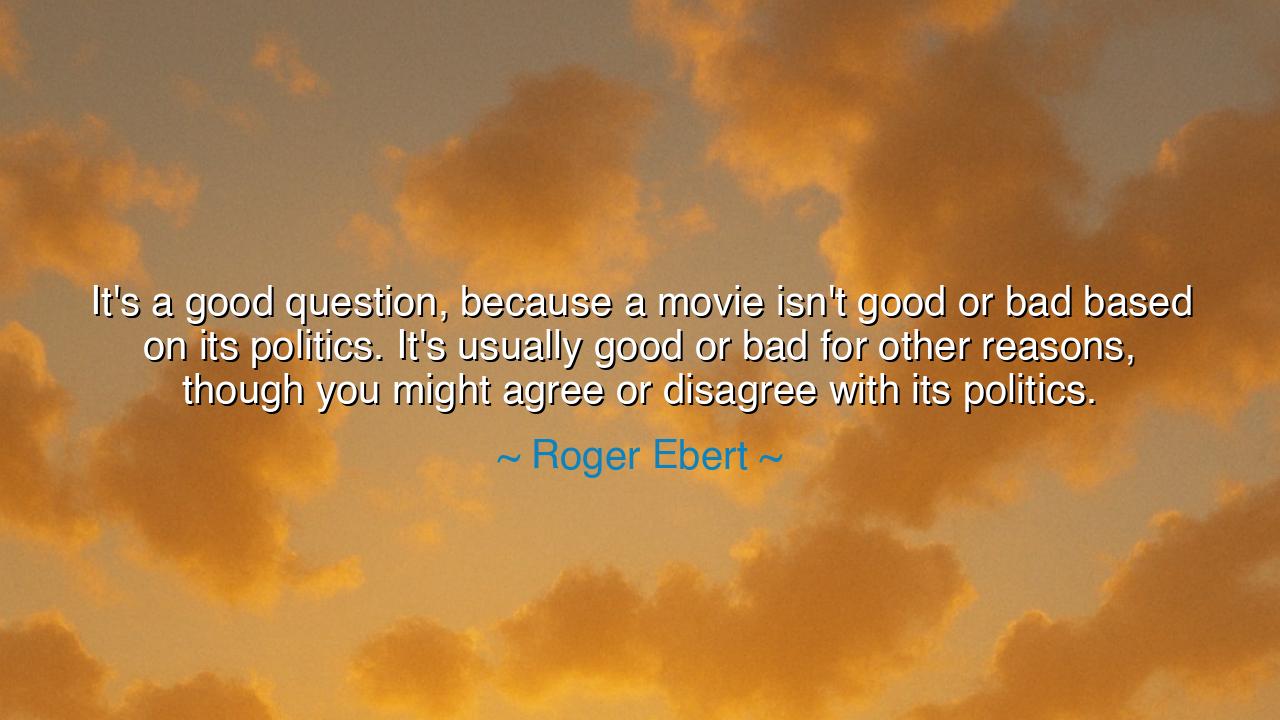
It's a good question, because a movie isn't good or bad based on
It's a good question, because a movie isn't good or bad based on its politics. It's usually good or bad for other reasons, though you might agree or disagree with its politics.






"It’s a good question, because a movie isn’t good or bad based on its politics. It’s usually good or bad for other reasons, though you might agree or disagree with its politics." Thus declared Roger Ebert, the great critic whose eyes pierced through illusion to find the heart of art. His words remind us of a vital truth: that the worth of creation lies not first in its ideology, but in its craft, its spirit, its power to move the human soul.
The ancients, too, understood this. The plays of Sophocles and Euripides were filled with politics of their time—wars, laws, and power struggles. Yet their immortality does not endure because of their alignment with party or faction, but because of their mastery of story, their ability to reveal universal truths about love, fate, and justice. A movie, like a tragedy, becomes great not through its slogans, but through its beauty, its depth, and its honesty.
History offers us the example of Casablanca. Created in the midst of the Second World War, its politics are plain: resistance against tyranny. Yet what has made it endure is not its political message alone, but its unforgettable characters, its dialogue, its music, and its aching exploration of sacrifice and love. Had it been only a political sermon, it would have withered; but because it was art, it became eternal.
So too we see the opposite. Films, books, or plays that loudly trumpet politics without artistry soon fall into obscurity. Their messages may align with the passion of the day, but when that passion passes, the work fades. Only when art transcends propaganda does it live beyond its moment. Thus Ebert’s wisdom stands: do not measure art solely by its stance, but by its soul.
Therefore, let this be taught to generations: art is judged by the fire of its creation, not by the banner it waves. You may agree or disagree with its politics, but what endures is its humanity, its vision, and its craft. To honor art is to see beyond faction and seek the eternal in the fleeting. A true movie—like a true poem or song—outlives its age not because of its politics, but because it speaks to the heart of man.






NNhann.
Personally, I’m experimenting with a two-column journal after each film: left side for technique (compositions I noticed, beats that landed, edits that sang), right side for values resonance. I delay the second column by a day, so the first isn’t contaminated by tribal reactions. Are there other debiasing moves you recommend—watch a pivotal scene on mute to judge visual grammar, read the script without images, or discuss with someone who disagrees with me? I want habits that keep discernment sturdier than opinion.
TNThanh Nguyen
How should I judge stories whose entire point is persuasion—documentaries, docudramas, satire, even propaganda-as-art? I don’t want to penalize them for having a stance, but I do want standards. Maybe a tripod: filmmaking craft (pacing, clarity, cinematic language), argument quality (steelman the opposition, evidence, absence of straw men), and ethical rigor (disclosures, consent, transparency about composites). Could you turn that into a short checklist I can apply after screenings, with examples of red flags that signal rhetoric is compensating for sloppy storytelling?
ATPham Nu Anh Thu
Criticism today often collapses into team jerseys. As a reader, how can I spot reviewers who evaluate technique rather than tribal alignment? After finishing a piece, I now ask: Did they cite frame-level evidence (blocking choices, lensing, sound cues)? Do they compare to craft precedents, not just ideological neighbors? Are they specific about where structure sags? I’d love a shortlist of critics or outlets known for method-heavy analysis and a few self-check questions to use before I let a hot take shape my watchlist.
TDNguyen Tat dat
I keep wrestling with admiration versus harm. Suppose a movie is exquisitely made but traffics in degrading stereotypes or invites the audience to relish cruelty. Is there a threshold where craft can’t redeem impact? I’d like a framework that weighs artistic achievement against social damage: clarity about targets, agency granted to depicted groups, historical context signaled within the story world, and the presence of counterspeech or complexity. Could you outline criteria for when to recommend, contextualize, or refuse, so discernment doesn’t collapse into either censoriousness or shrugging?
NPNguyen Phap
I’m trying to build a way to judge films that separates craft from ideology so my ratings don’t just mirror my beliefs. Could you share a simple rubric that scores direction, editing rhythms, performance credibility, production design, sound intelligibility, and narrative coherence—then, in a separate column, records the film’s worldview and moral impact? What questions keep the lanes clear, like: Do the choices create emotional clarity? Are setups paid off? Are images doing narrative work? If the theme were swapped, would the structure still hold? I want guardrails against letting agreement masquerade as quality.